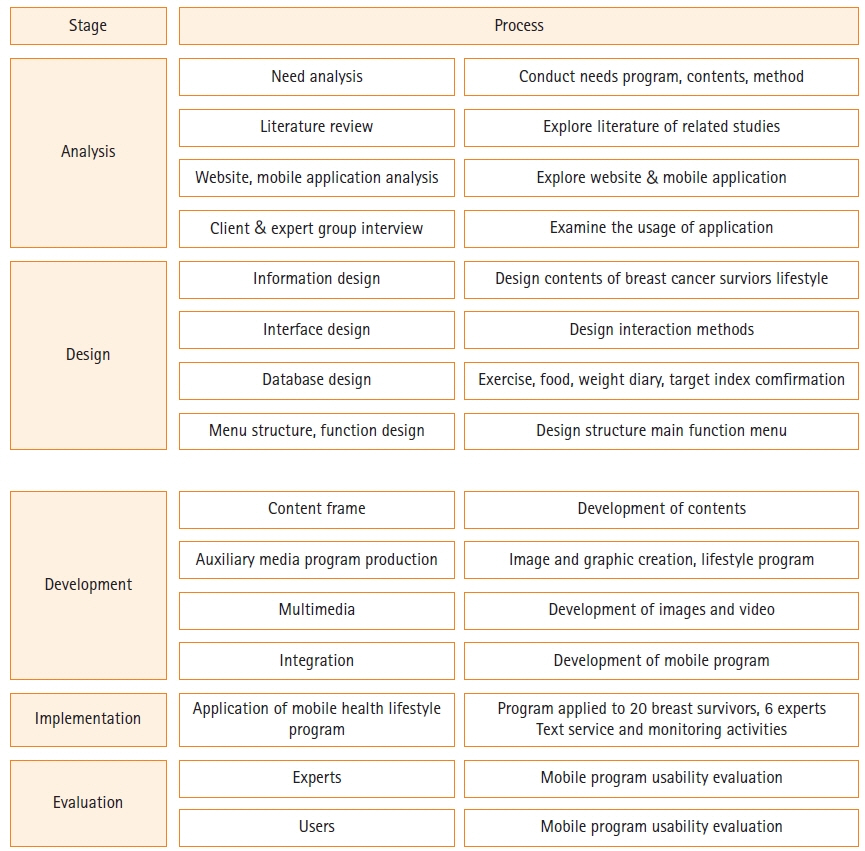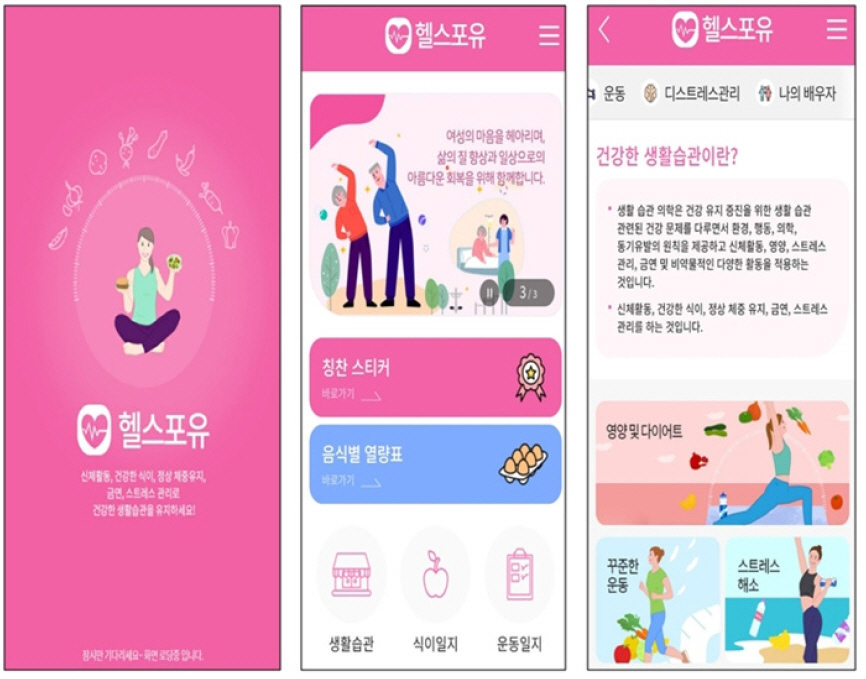Korean J Women Health Nurs.
2021 Sep;27(3):243-255. 10.4069/kjwhn.2021.09.14.
The development of a lifestyle modification mobile application, “Health for You” for overweight and obese breast cancer survivors in Korea
- Affiliations
-
- 1Department of Nursing, Kunjang University College, Gunsan, Korea
- 2College of Nursing, Jeonbuk Research Institute of Nursing Science, Jeonbuk National University, Jeonju, Korea
- 3Department of General Surgery, Presbyterian Medical Center, Jeonju, Korea
- KMID: 2521519
- DOI: http://doi.org/10.4069/kjwhn.2021.09.14
Abstract
- Purpose
This study aimed to develop a lifestyle modification (LSM) mobile application based on the Android operating system for overweight and obese breast cancer survivors (BCS) in Korea and evaluate its usability.
Methods
The content analysis, design, development, implementation, and evaluation of the LSM intervention mobile application for overweight and obese BCS was conducted by identifying survivors’ needs, searching the literature, and reviewing existing mobile applications. The survey was conducted from June 1 to December 28, 2020 at Jeonju city, Korea.
Results
The mobile application for BCS included dietary and exercise information, weight logs, as well as distress and daily achievement check. It also included information and videos on the prevention of breast cancer recurrence and used a communication bulletin board. Expert and user usability evaluation of its content and functions confirmed that it was appropriate and satisfactory for overweight and obese BCS.
Conclusion
This LSM mobile application developed for overweight and obese BCS was found to be appropriate for use. It can be applied for further study of effectiveness on improving their health and maintaining a healthy lifestyle, to ultimately improve quality of life.
Keyword
Figure
Reference
-
References
1. Anderson WF, Jatoi I, Devesa SS. Assessing the impact of screening mammography: breast cancer incidence and mortality rates in Connecticut (1943-2002). Breast Cancer Res Treat. 2006; 99(3):333–340. https://doi.org/10.1007/s10549-006-9214-z.
Article2. Korea Breast Cancer Society. Breast cancer facts & figures 2018 [Internet]. Seoul: Author;2018. [cited 2018 Nov 1]. Available from: http://www.kbcs.or.kr/journal/file/181030.pdf.3. McCorkle R, Ercolano E, Lazenby M, Schulman-Green D, Schilling LS, Lorig K, et al. Self-management: enabling and empowering patients living with cancer as a chronic illness. CA Cancer J Clin. 2011; 61(1):50–62. https://doi.org/10.3322/caac.20093.
Article4. Oh YK, Hwang SY. Impact of uncertainty on the quality of life of young breast cancer patients: focusing on mediating effect of marital intimacy. J Korean Acad Nurs. 2018; 48(1):50–58. https://doi.org/10.4040/jkan.2018.48.1.50.
Article5. Seo JS, Park HA, Kang JH, Kim KY, Cho YK, et al. Obesity and obesity-related lifestyles of Korean breast cancer survivors. Korean J Health Promot. 2014; 14(3):93–102. https://doi.org/10.15384/kjhp.2014.14.3.93.
Article6. Jung KW, Won YJ, Kong HJ, Oh CM, Cho H, Lee DH, et al. Cancer statistics in Korea: incidence, mortality, survival, and prevalence in 2012. Cancer Res Treat. 2015; 47(2):127–141. https://doi.org/10.4143/crt.2015.060.
Article7. Rock CL, Doyle C, Demark-Wahnefried W, Meyerhardt J, Courneya KS, Schwartz AL, et al. Nutrition and physical activity guidelines for cancer survivors. CA Cancer J Clin. 2012; 62(4):243–274. https://doi.org/10.3322/caac.21142.
Article8. Eakin EG, Hayes SC, Haas MR, Reeves MM, Vardy JL, Boyle F, et al. Healthy living after cancer: a dissemination and implementation study evaluating a telephone-delivered healthy lifestyle program for cancer survivors. BMC Cancer. 2015; 15:992. https://doi.org/10.1186/s12885-015-2003-5.
Article9. Karavasiloglou N, Pestoni G, Wanner M, Faeh D, Rohrmann S. Healthy lifestyle is inversely associated with mortality in cancer survivors: results from the Third National Health and Nutrition Examination Survey (NHANES III). PLoS One. 2019; 14(6):e0218048.
Article10. McCarroll ML, Armbruster S, Pohle-Krauza RJ, Lyzen AM, Min S, Nash DW, et al. Feasibility of a lifestyle intervention for overweight/obese endometrial and breast cancer survivors using an interactive mobile application. Gynecol Oncol. 2015; 137(3):508–515. https://doi.org/10.1016/j.ygyno.2014.12.025.
Article11. Baek SY, Choi JY. A comparative study on the characteristics of cancer patients and cancer survivors. Asian Oncol Nurs. 2018; 18(1):11–20.
Article12. Park JH, Chun M, Jung YS, Bae SH, Jung YM. Psychoeducational approach to distress management of newly diagnosed patients with breast cancer. J Korean Acad Nurs. 2018; 48(6):669–678. http://doi.org/10.4040/jkan.2018.48.6.669.
Article13. Kwon EJ, Yi M. Distress and quality of life in breast cancer survivors in Korea. Asian Oncol Nurs. 2018; 12(4):289–296. http://doi.org/10.5388/aon.2012.12.4.289.
Article14. Mandel JC, Kreda DA, Mandl KD, Kohane IS, Ramoni RB. SMART on FHIR: a standards-based, interoperable apps platform for electronic health records. J Am Med Inform Assoc. 2016; 23(5):899–908. https://doi.org/10.1093/jamia/ocv189.
Article15. Turner-McGrievy GM, Beets MW, Moore JB, Kaczynski AT, Barr-Anderson DJ, Tate DF. Comparison of traditional versus mobile app self-monitoring of physical activity and dietary intake among overweight adults participating in an mHealth weight loss program. J Am Med Inform Assoc. 2013; 20(3):513–518. https://doi.org/10.1136/amiajnl-2012-001510.
Article16. Pyo MY, Kim JY, Sohn JO, Lee ES, Kim HS, Kim KO, et al. The effects of an advanced cardiac life support training via smartphone’s simulation application on nurses’ knowledge and learning satisfaction. J Korean Clin Nurs Res. 2012; 18(2):228–238. https://doi.org/10.22650/JKCNR.2012.18.2.228.
Article17. Lyons EJ, Baranowski T, Basen-Engquist KM, Lewis ZH, Swartz MC, Jennings K, et al. Testing the effects of narrative and play on physical activity among breast cancer survivors using mobile apps: study protocol for a randomized controlled trial. BMC Cancer. 2016; 16:202. https://doi.org/10.1186/s12885-016-2244-y.
Article18. Park G, Lee H, Kim HY. The effects of utilizing smartphone application peer support on health behavior and body mass index among breast cancer survivors. J Korean Acad Nurs. 2019; 49(5):550–561. https://doi.org/10.4040/jkan.2019.49.5.550.
Article19. Seels B, Richey R. Instructional technology: the definition and domains of the field. Washington, DC: Association for Educational Communications and Technology;1994.20. Dick W, Carey L, Carey JO. Systematic design of instruction. 8th ed. Upper Saddle River, NJ: Pearson;2014.21. Kim MR. Development and evaluation of smartphone app evaluation tools for health care [doctoral degree]. Seoul: Seoul University;2014. 65.22. Stoyanov SR, Hides L, Kavanagh DJ, Zelenko O, Tjondronegoro D, Mani M. Mobile app rating scale: a new tool for assessing the quality of health mobile apps. JMIR Mhealth Uhealth. 2015; 3(1):e27. https://doi.org/10.2196/mhealth.3422.
Article23. Schmitz KH, Ahmed RL, Hannan PJ, Yee D. Safety and efficacy of weight training in recent breast cancer survivors to alter body composition, insulin, and insulin-like growth factor axis proteins. Cancer Epidemiol Biomarkers Prev. 2005; 14(7):1672–1680. https://doi.org/10.1158/1055-9965.EPI-04-0736.
Article24. Choi JH, Park SJ, Kwon H, Lee HJ. Application and evaluation of mobile nutrition management service for breast cancer patients. J Nutr Health. 2020; 53(1):83–97. https://doi.org/10.4163/jnh.2020.53.1.83.
Article25. Nho JH, Hwang ES. Effects of multidisciplinary lifestyle modification program on health-promoting behavior, psychological distress, body composition and reproductive symptoms among overweight and obese middle-aged women. J Adult Nurs. 2019; 31(6):663–676. https://doi.org/10.7475/kjan.2019.31.6.663.
Article26. Chnug BY, Hong SJ. Effects of smart-care services program for breast cancer survivors. J Korean Acad Soc Nurs Educ. 2021; 27(2):95–106. http://doi.org/10.5977/jkasne.2021.27.2.95.
Article27. Klasnja P, Pratt W. Healthcare in the pocket: mapping the space of mobile-phone health interventions. J Biomed Inform. 2012; 45(1):184–198. https://doi.org/10.1016/j.jbi.2011.08.017.
Article28. Park YL. Development and effectiveness of self-management mobile application for hemodialysis patients [doctoral degree]. Jeonju: Jeounbuk National University;2016. 50.29. Kang J, Suh EE. The influence of stress, spousal support, and resilience on the ways of coping among women with breast cancer. J Korean Oncol Nurs. 2015; 15(1):1–8. https://doi.org/10.5388/aon.2015.15.1.1.
Article30. Seo SJ, Nho JH, Lee M, Park Y. Influence of lifestyle, depression, and marital intimacy on quality of life in breast cancer survivors. J Women Health Nurs. 2020; 26(1):28–36. https://doi.org/10.4069/kjwhn.2020.03.05.
Article
- Full Text Links
- Actions
-
Cited
- CITED
-
- Close
- Share
- Similar articles
-
- Application and evaluation of mobile nutrition management service for breast cancer patients
- Effects of Multidisciplinary Lifestyle Modification Program on Health-promoting Behavior, Psychological Distress, Body Composition and Reproductive Symptoms among Overweight and Obese Middle-aged Women
- Impact of a Lifestyle Modification Program on Menstrual Irregularity among Overweight or Obese Women with Polycystic Ovarian Syndrome
- FIT4PEDON: Mobile Nutrition Counseling Application Effectiveness and Usability for Childhood Cancer Survivors
- The Effects of Lifestyle and Self-rated Health on Mental Health of Breast Cancer Survivors: Using Propensity Score Matching Approach



